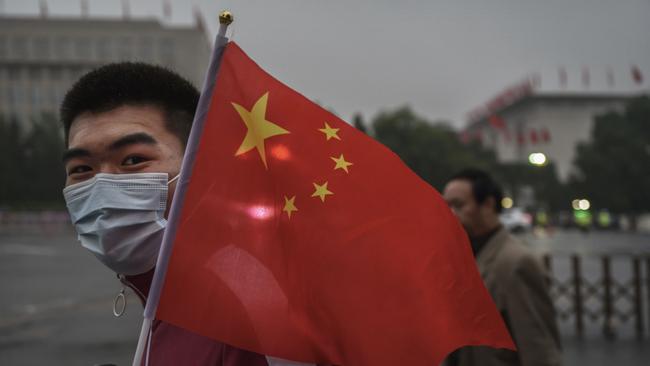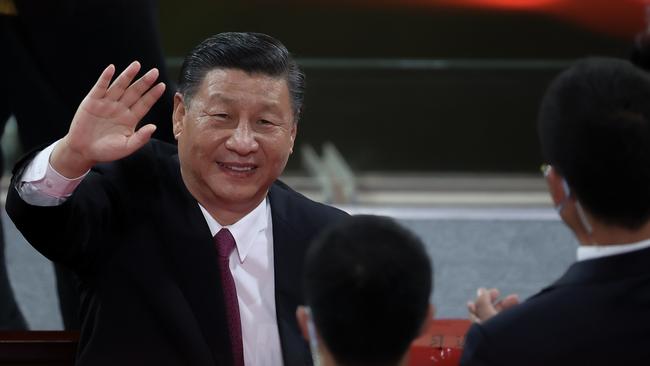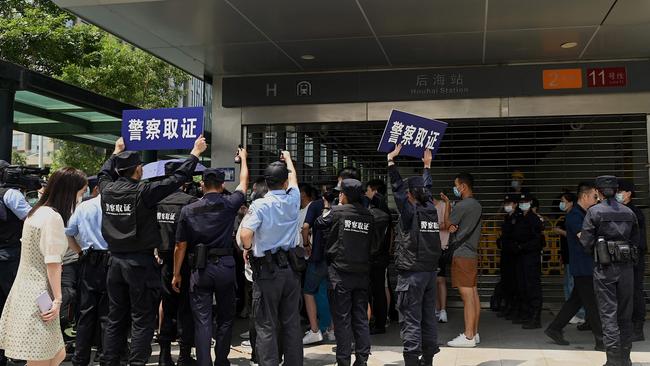Evergrande reaches deal to delay default as debt crisis intensifies
A Chinese real estate titan on the brink of ruin has inked a last-minute deal to keep it afloat – but it could still be heading for disaster.
Economy
Don't miss out on the headlines from Economy. Followed categories will be added to My News.
The world’s most indebted real estate company has managed to reach a last-minute deal, delaying a potential collapse that experts feared could spark a global financial contagion.
China Evergrande Group, the country’s second biggest property developer, has managed to rack up staggering debts totalling more than $A432 billion.
Today, interest payments on two Evergrande notes – worth tens of millions of dollars – were due – and if the real estate juggernaut had failed to make good, as many experts predicted, there were growing fears it could have triggered a credit crunch.
And that could spell disaster for not just the Chinese economy, but global markets too.
However, just as the deadline loomed, the firm announced its main unit, Hengda Real Estate Group, had managed to reach an agreement which would allow it to make a coupon payment on its domestic bondholders on September 23.
While that has calmed concerns of an immediate collapse, the company could still end up defaulting later on, with the new deal essentially kicking the can down the road.
But it’s been enough to settle nerves, with iron ore bouncing back on the news.
Credit crunch
In a nutshell, financial gurus are worried that the Evergrande disaster could become a global contagion, where a crash in one market can spread to others.
There are growing fears the Evergrande saga could cause masses of investors to take their money out of global institutions simultaneously.
If that happens, it will in turn cause financial woes for those institutions, a situation known as a credit crunch.

In the event of a credit crunch, the world could see a slowdown of economic activity as well as a rise in unemployment, causing a recession.
If that sounds familiar, you’re right – it’s what happened back in 2008 when the global financial crisis hit.
Evergrande’s downfall
Founded in 1996 and originally known as the Hengda Group, the company is one of the biggest in China.
It claims to own more than “1300 projects in more than 280 cities in China”.
It is the 122nd largest group in the world by revenue, based on the 2021 Fortune Global 500 List, and is based in China’s Guangdong Province.
Over the years, it has expanded well beyond real estate, and now has interests in broad areas including electric vehicles, internet and media, and food.
The firm’s troubles began as China’s real estate market soared, with demand for homes in cities such as Beijing and Shanghai sending prices skyrocketing.
The company took out a string of loans and expanded rapidly, snapping up assets and making the most of China’s thriving economy.
But when property prices began to drop in smaller cities, and when the Chinese government rolled out measures to curtail over-the-top property borrowing last year as part of the so-called “three red lines” policy crackdown, it left Evergrande in the lurch, with mountains of debt.

On Monday, Bloomberg reported Evergrande failed to make interest repayments to two major creditors – and most insiders are convinced the firm will also be unable to pay around $US83.5 million ($A115 million) in dollar-bond interest, which is due tomorrow.
The situation facing the company is now so dire that Hedge Fund Telemetry LLC president Thomas Thornton has described the property developer as being in a “death spiral”.
Impact on the rest of us
The crisis facing Evergrande is so massive that there are already signs the crisis is spilling over into even unrelated industries.
Art Hogan, chief strategist at National Securities Corporation, told Bloomberg News Evergrande coupled with other financial concerns would cause “irrational de-risking” which doesn’t necessarily “connect logically”.
“Does it make sense for technology stocks to be selling? No, but in a risk-off scenario, everything tends to be for sale – even cryptocurrencies,” he said, in reference to Monday’s bitcoin bloodbath.
Jimmy Chang, chief investment officer at Rockefeller Global Family Office, told CNBC this week that if Beijing let the company collapse, the consequences would likely be global.
“Everyone was expecting the government would have some kind of resolution, given that Evergrande is a systemically important company,” he said.
“It has $300 billion in outstanding debt. There is a contagion issue if China Evergrande is not resolved.

“If China were to have a serious economic issue because of China Evergrande, the rest of the global economy would have contagion from it.”
Meanwhile, Australia is also facing a relatively unique risk from the potential Evergrande collapse, with many expecting the situation to have serious ramifications for China’s construction industry – which in turn will hurt Australia’s iron ore sector, which is heavily reliant on China.
And it seems like we’re already starting to feel the pinch.
On Monday, $50 billion was wiped off the Australian sharemarket as the iron ore price collapsed to $US90 a tonne, down by 60 per cent since its record high in May.
Originally published as Evergrande reaches deal to delay default as debt crisis intensifies




